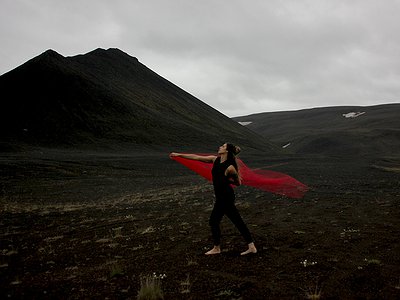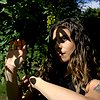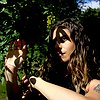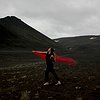Can you talk about a breakthrough work, event or performance in your career? Why does it feel special to you? When, why and how did you start working on it, what were some of the motivations and ideas behind it?
In 2013, I was co-running an art space/venue in Asheville, NC. For our 1 year anniversary, we decided to put on an event to showcase how our personal work had evolved. I had been working with an incredible instructor named Janet Barratt. Unlike any teacher I had studied under previously, Janet fully embraced and encouraged my personal tastes in vocal repertoire. We had been working on a lot of art songs and experimental pieces, and she never restricted me from the more dramatic vocal roles that I felt more creatively aligned with.
We were working on “Un bel di vedremo” from Puccini’s Madame Butterfly. It’s so heartachingly beautiful and I felt moved to share it, even if it felt out of place at a DIY venue. I decided to rework and reimagine the song through an electronic music medium. Using samples and synthesizers, I created what would eventually become my first song as Lush Agave - “Madame”. My performance served as a way to honor what I loved about operatic traditions and my own personal rituals. I wore a robe and sang seated on the floor, surrounded by candles in complete darkness. The space felt so intimate, and I loved being on the same level with the audience.
That performance shifted something, and I knew that I had to continue the journey.
There are many descriptions of the ideal state of mind for being creative. What is it like for you? What supports this ideal state of mind and what are distractions? Are there strategies to enter into this state more easily?
I like to feel that I am completely alone. My partner and I are lucky to have a dedicated room for a tiny studio, so I’ll lock myself in there to work. I really enjoy making the room as dark as possible, using candles and red lights.
Movement is also extremely important to my practice. While my performances usually showcase very subtle and flowing dances, the movement I incorporate into practice is … not. I’m usually pacing, squatting, making big arm movements, and jumping to encourage a sporadic and free sound.
Music and sounds can heal, but they can also hurt. Do you personally have experiences with either or both of these? Where do you personally see the biggest need and potential for music as a tool for healing?
Creating music for this specific project is a way to process trauma for me. I don’t always draw from that space, but when I do, it’s a painful experience for sure. This is another reason why I’ve had to recognize that churning out albums every few months or something is not going to be possible for me. I just can’t put myself in that mindset every day. But I always find a better sense of peace and closure on the other side of that though.
My experience as a voice teacher and volunteering with organizations such as Girls Rock Camp serve as a reminder that access to music education and even gear can further empower people to create music that can encourage their own healing and others.
There is a fine line between cultural exchange and appropriation. What are your thoughts on the limits of copying, using cultural signs and symbols and the cultural/social/gender specificity of art?
If we are to be creators then our goal should be to avoid destruction and suffocation of our inspirations at all costs. There’s nothing wrong with being moved and influenced by art and culture that is not our own, but it’s important that we acknowledge, honor, and uplift them instead of stealing from them.
We can recognize cultural appropriation when one group of people can be celebrated for a creation/style/etc while the originators are looked down upon or shamed. As part of the journey of creating art, I think it’s a beautiful practice to look deeply into where our inspirations came from, who the innovators were. To ask ourselves how we benefit in incorporating X, and if so, if it harms or overlooks someone/something else. This is a practice of caring for ourselves and others.
Our sense of hearing shares intriguing connections to other senses. From your experience, what are some of the most inspiring overlaps between different senses - and what do they tell us about the way our senses work?
Hearing, and I really listening specifically, gives us an ability to exist outside of space and time. Listening to certain songs or noises can transport me to different moments in life and bring back their visceral sensations, both pleasant and unpleasant, in the form of touch, taste, smell, and vision. Listening to and observing the sounds in the current moment gives the ability to disconnect from cyclical thinking and feel more connected to the world around me. It provides a sense of expansion and an opportunity to witness how the generator of a sound resonates with this energy. Being able to listen allows us to tune into whatever is deep inside, generating our unique creativity.
Art can be a purpose in its own right, but it can also directly feed back into everyday life, take on a social and political role and lead to more engagement. Can you describe your approach to art and being an artist?
My experience in the world and what I’m witnessing is always going to inform my art, so I try to stay as honest about that as possible. Processing it all in a creative space helps empower me to engage with my community and work on the issues I care about in a more authentic way.
What can music express about life and death which words alone may not?
I always like to think about how singing is older than language, and will insist that whales make the most beautiful music possible. Music has always existed and will continue to exist forever in the sense that sounds are not required to fall into a human-defined structure to create what we notice as “music”. In that way, music transcends life and death. Humans are only giving it generational meaning.





